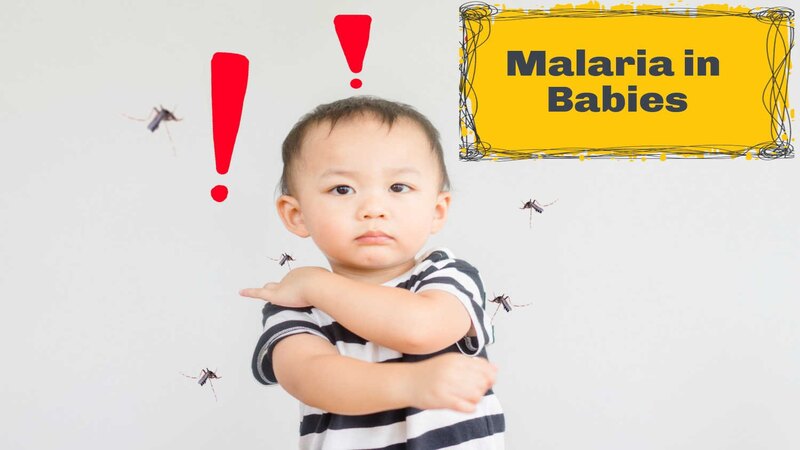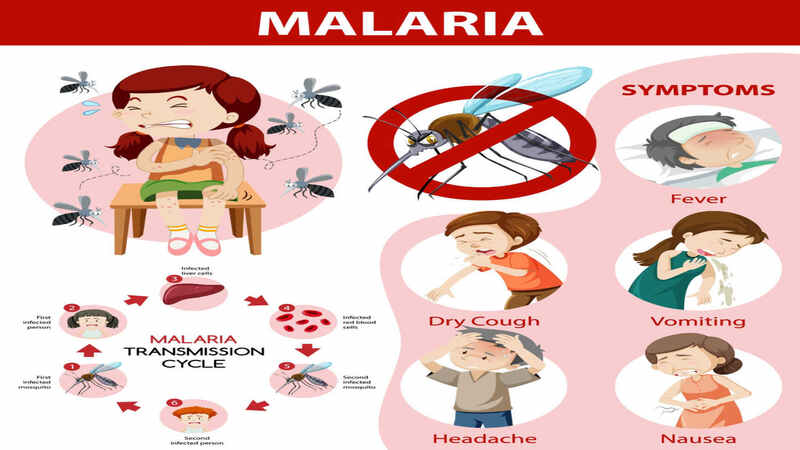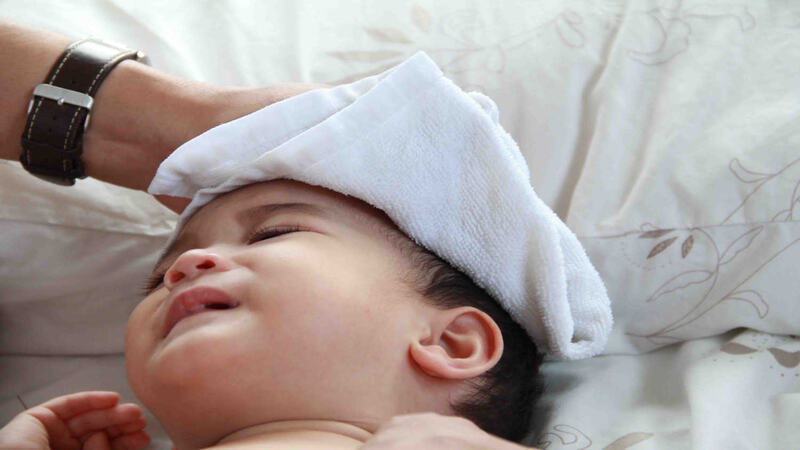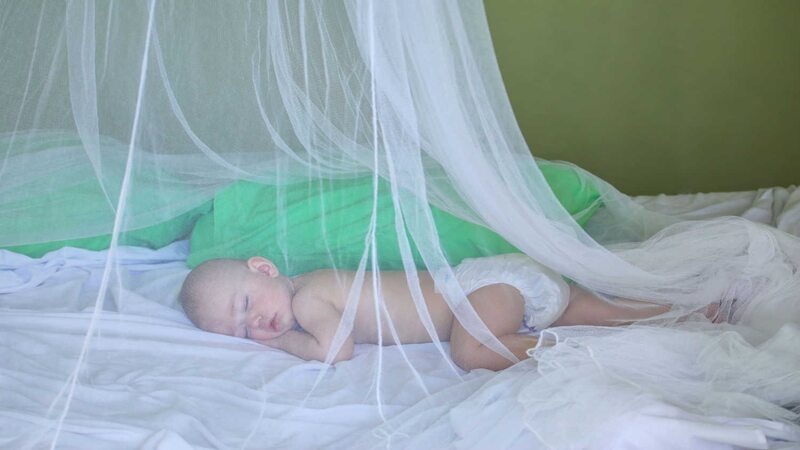
Malaria is a mosquito-borne disease and is common in tropical and subtropical regions. Kids and adults acquire this infection through female Anopheles mosquito bites. The disease induces a cycle of chills, high fever, drowsiness, and flu-like symptoms in babies and adults. If the infection persists for longer, it can lead to other complications. Malaria in babies can be quite common in countries like India where it is widely prevalent.
Hence, it is good to know the symptoms of malaria and take the necessary steps to prevent your babies from such diseases. Let’s dive in to know about malaria in babies, causative agents, symptoms, diagnosis and the available treatment options.
What is Malaria?
Malaria is a parasitic disease that occurs by a parasite, Plasmodium. It spreads in babies through the bite of Anopheles mosquito that feeds on the baby’s blood. The mosquito carries malaria parasites into their saliva. When the mosquito bites, it transmits the parasite into the bloodstream. The symptoms include fever, and chill, followed by diarrhea and vomiting.
What Causes Malaria in Babies?
Malaria can happen in babies due to several reasons listed below.
1. Bite of Female Anopheles Mosquitoes
Malaria in babies occurs due to the bite of the female anopheles mosquito. The plasmodium parasite transmits to the babies when the mosquito feeds on their blood. Once the parasite enters the body, it reaches the liver, where it multiplies and infects the red blood cells. The mature parasites rupture the red blood cells and trigger malaria symptoms.
Other than this, five different types of plasmodium parasites can cause malaria in babies and adults. These are as follows
a) Plasmodium Falciparum
This is one of the common malarial parasites. It is dangerous and is responsible for major health complications. This is generally found in the African region.
b) Plasmodium Vivax
This is predominantly found in South America and Asia. It is not very dangerous, but once it enters the body, it stays in the liver for more than three years and causes malaria periodically.
c) Plasmodium Malariae
This is less common and normally found in Africa.
d) Plasmodium Ovale
It is very uncommon and is mostly found in West Africa.
e) Plasmodium Knowlesi
This is the rarest form of malarial parasite and is mainly found in Southeast Asia.
2. Infected Donor Blood
Malaria parasites can also be transmitted through infected blood. Hence, if babies receive blood from a malaria-infected person, the plasmodium parasite will be transmitted into baby’s blood. Malarial parasites can also be transmitted through infected needles which is a very rare occurrence.
3. Congenital Malaria
The malarial parasite reaches the fetus through the placenta. Hence, a newborn baby may also be born with malaria if a mother has malaria during pregnancy.
7 Common Symptoms of Malaria in Babies

Babies affected with malaria may exhibit several signs and symptoms, such as irritability, drowsiness, lethargy, and restlessness. Some babies often experience diarrhea and nausea too. However, some of the common symptoms are as follows
1. High Fever
Babies may have high fever along with sweating and chills. A high fever can cause febrile seizures in many babies.
[Read : Dealing With Febrile Convulsions In Babies]
2. Headache
Malaria in babies can also cause severe headaches, just like in adults. However, if several other malaria symptoms accompany the headache, parents must be concerned about this and consult with a doctor promptly.
3. Vomiting
Malaria can also result in vomiting in babies and may also have acute diarrhea.
4. Stomach Pain and Poor Appetite
Some babies may suffer nausea and stomach pain when infected with malarial parasites. In addition to stomach pain, babies suffer from poor appetite and irritability.
5. Drowsiness
Babies may become moody and cranky when they get ill and tired. However, when they get malaria, babies may feel drowsy and irritated.
6. Cold and Cough
Along with fever babies do suffer from cold and cough. If you see these symptoms, it would be great to consult with a doctor before the symptoms get worse.
[Read : Cold in Babies]
7. Sleeplessness
Malaria also causes sleeplessness or insomnia in babies. Due to this, they may feel weak and irritated. In that case, a quick blood test is necessary to confirm malaria. This can help the doctors take necessary treatment actions.
How is Malaria Diagnosed in Babies?
The doctors will consider all the symptoms and proceed with these tests to confirm malaria.
1. Blood Test
Doctors will do a blood test because the plasmodium parasite is easily noticeable under a microscope. The blood smear will be taken on a slide and stained with dyes. The slide will be observed under a microscope.
2. Rapid Diagnostic Tests
This test is usually performed when a microscope is not available. It will detect malarial antigens using a cassette format and dipstick. The test will take 2-15 mins to display the results.
Treatment Options For Malaria in Babies

The treatment of malaria for babies mainly involves rest and administering medicines along with a healthy diet.
- Doctors mainly prescribe anti-malarial drugs like chloroquine and quinine based on malaria type and its symptoms.
- Some other antimalarial drugs given to babies by doctors are Mefloquine (Lariam), Doxycycline (Vibramycin), Atovaquone (meprin), Proguanil (Malarone), Primaquine, Hydroxychloroquine (Plaquenil), etc.
- Complicated cases are treated with other intravenous medications.
- Doctors may decide the treatment duration based on the severity of the disease and current health condition of the infant.
Meanwhile, at home, you can try easing the symptoms by following these steps
- Babies may feel weak and suffer from muscle fatigue. Hence, your babies must get adequate rest if they catch the infection.
- Providing a healthy diet for your baby when they have malaria is essential.
- It is advisable to sponge bathe your baby regularly to reduce temperature. Doctors may also advise giving paracetamol to the babies to reduce fever.
Disclaimer: Please note, do not give your babies any anti-malarial drug without consultation with a certified doctor. It can cause severe issues and may increase the risk of death.
[Read : How To Bring Down A Fever In Babies?]
Top 5 Tips to Prevent Malaria in Babies

Some of the preventive tips are as follows:
- Use mosquito repellent and apply it to the baby’s body. Make sure to follow the label’s instructions before using it on your baby.
- Sleep with a mosquito net on. When the mosquitoes that transmit dengue and yellow fever are active, use small nets for your baby during the daytime naps.
- Add mosquito netting to your doorways and windows. It is better to choose removable or adhesive meshes. They give better ventilation.
- Use mosquito-repelling essential oils like eucalyptus, neem, citronella, lemongrass, and citronella. They can keep mosquitoes away, although their effects are short-lived and might not be as powerful as conventional repellents.
- You can burn coconut husks, neem leaves, and shells, these are effective in fending off insects and mosquitoes. Regular fumigation prevents mosquito breeding in your neighborhood and around your home.
Malaria in babies needs proper attention and prompt medical care. Babies may take longer to recover from malaria, depending on the severity, type of malaria, and the treatment given by the doctor. In addition to treatment, ensure to follow preventive measures and maintain hygiene around your babies. Use mosquito repellents to keep the mosquitoes away from your child. Last but not least, consult your pediatrician when in doubt.
FAQ’s
1. What Are the Three Stages of Malaria?
Malaria parasites attack individuals in three stages. Male gametes developing into the mosquito, sporozoite formation, live stage proliferation, and the blood stage asexual reproduction. The first two stages occur within the mosquito, and the blood stage shows symptoms of malaria, such as fever, chill, vomiting, and other symptoms.
2. Can Malaria Go Without Treatment in Babies?
Malaria follows a cycle, once it is completed, it may go without treatment. However, with the right treatment, symptoms of malaria can regress quickly, and your baby will be fine within a week or two. Without regular treatment, malaria symptoms may worsen, and the chances of getting periodical malaria increases.
3. Can a Baby Get Malaria Through Breastfeeding?
No, malaria doesn’t pass to the baby from the mother through breastfeeding.
4. Can Malaria Cause Diarrhea in Babies?
Yes, diarrhea is also a symptom of malaria in babies.
